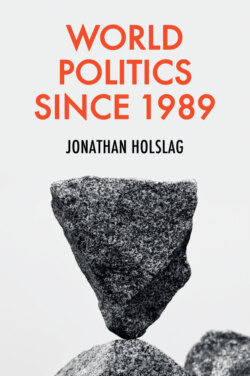Читать книгу World Politics since 1989 - Jonathan Holslag - Страница 32
Challenges on the horizon?
ОглавлениеConcerns about the internal problems thus led to concerns about the position of the West in the world. The United States had the power resources to lead. Trade and investment made countries more dependent on one another. But interdependence required Americans to have an open attitude toward the world, to invest in international institutions.47 It was questioned whether the United States was able to act like a leader, not so much because of its natural penchant for isolationism, but because internal uncertainty aggravated a tendency to introversion.48 Books whose covers promised American leadership carried sobering analyses inside, monodies about America’s economic fragility and how it all crippled its capability to compete with new economic challengers.49
The Organization for Economic Cooperation and Development, OECD, echoed this concern. “It is alarming,” it remarked, “at least for anyone living in Western Europe or North America, in that the focus of world economic power will shift inexorably . . . towards the Far East.”50 It was no moment for self-satisfaction when Western households were falling for Asian ingenuity: Nintendo’s Gameboy, Sony’s Walkman, and Toyota SUVs. In spite of Japan having entered a decade of slow growth, manufacturers remained strong. On the one hand, it sourced from cheap countries like China. On the other hand, Japan demonstrated that, confronted with competition and a mature home market, rich countries could upgrade instead of relocating, by investing in technology, quality, and automation.51 Instead of running trade deficits, Japan preserved modest surpluses. And in Japan’s wake followed other markets: South Korea, Taiwan – and China.
The fall of the Iron Curtain reinforced the idea that communication would bring commerce and cooperation. Soft power, or the ability of a state to attract, would grow more important. Virtual power, the ability to innovate, to establish strong brands, and to profit from the resources and cheap labor elsewhere was presented as an efficient way for the West to continue to lead. Confidence was drawn also from European integration. A dozen countries kept going further in economic integration. They were ready to pass sovereignty on matters like customs to supranational institutions.52 Some saw the European experience leading to a deeper transformation, a transformation of the mind. Instead of being fixated with sovereignty, citizens came to see themselves as Europeans. Identities changed and so did the very nature of power politics. The predators, who bloodily fought each other for centuries, had become herbivores. Anarchy is what states make of it.53 If Europe could do it, why could the rest of the world not follow?
This optimistic notion, however, was criticized. Had the Europeans truly become herbivores? Member states retained sovereignty on matters like security and foreign policy. And while they had become more civilized toward one another, they were still seen as predators elsewhere. In the United States, diplomats cautioned that in spite of the swollen language about values, its moral credibility was limited. While the world looked benign through the lens of economic liberalism and the constructivist idea of world citizenship, the existing order also meant inferiority and exploitation to others. Hence, friction would be inevitable. “The West should not expect the world to become a more peace loving or free place,” wrote an academic. “The future does not promise to be more tranquil. . . . The day of the dictator is not over and many nations are ruled by repressive governments. . . . We still live in an anarchic international order.”54 While the Central Intelligence Agency was criticized for having failed to predict the fall of the Soviet Union, it did provide intelligence assessments about the risk of instability in the Middle East and Africa, and uncertainty about China and Russia’s future.55 The Department of Defense drafted an internal vision document that stated the need for “convincing potential competitors that they need not aspire to a greater role or pursue a more aggressive posture to protect their legitimate interests.”56
Western societies were aware that the unipolar moment was shaky. But was the West ready to act upon it? The most skeptical assessment was that the Western world was set to follow the fate of declining empires in the past. Had the United States not arrived at the point where Venice was around 1500, Holland around 1660, and Britain around 1873? The watershed between rise and fall. Declinists referred to the Soviets challenging American technological leadership with the launch of the Sputnik in 1957, the oil crisis of 1973, President Ronald Reagan’s unwillingness to address fiscal and trade deficits when they were still small in the 1980s.57 The productivity edge relative to that of rival states had begun to fritter away but the costs of preserving global influence did not diminish.58 “Today America is where Britain was around the turn of the century,” one renowned economist asserted. “Rome lasted a thousand years, the British Empire about 200; why are we slipping after about 50 years?”59
